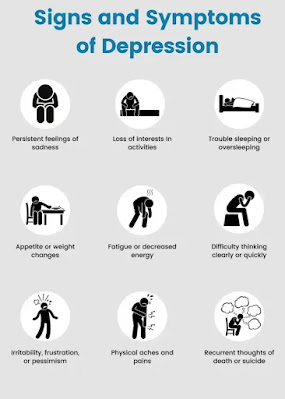
Signs and Symptoms
Depression can manifest in a variety of ways, but some common signs and symptoms include:
Persistent feelings of sadness, hopelessness, or emptiness
Loss of interest in activities that were once enjoyable
Changes in appetite or weight
Difficulty sleeping or oversleeping
Fatigue or lack of energy
Feelings of worthlessness or guilt
Difficulty concentrating or making decisions
Thoughts of self-harm or suicide
Age Factors
Depression can impact individuals of any age, but it may manifest differently depending on the age of the individual. Children and adolescents may exhibit symptoms such as irritability or behavioral problems, while older adults may experience physical symptoms such as fatigue or pain.
Causes and Genetic Factors
The causes of depression are not fully understood, but research has shown that there may be both genetic and environmental factors involved. Studies have found that depression tends to run in families, suggesting that there may be a genetic component to the disorder. Environmental factors, such as stress or trauma, can also contribute to the development of depression.
Discovery and Medical Help
Depression is typically diagnosed by a healthcare provider based on a thorough evaluation of the individual's symptoms and medical history. This may include a physical exam, blood work, and interviews with the individual and their family members. There are also standardized screening tools that can be used to assess symptoms of depression.
If you suspect that you or a loved one may be experiencing depression, it is important to seek medical help. A healthcare provider can help to determine if depression is the cause of the symptoms and can provide guidance on the best course of treatment.
Treatment and Medications
There are several treatment options available for depression, including medication, psychotherapy, and lifestyle changes. Medications such as selective serotonin reuptake inhibitors (SSRIs) and serotonin-norepinephrine reuptake inhibitors (SNRIs) can help to improve mood and reduce symptoms of depression. Psychotherapy, such as cognitive-behavioral therapy (CBT), can help individuals with depression learn new skills and strategies for managing their symptoms. Lifestyle changes, such as exercise and a healthy diet, can also be beneficial for individuals with depression.
Follow-Up
Following a diagnosis of depression, it is important to have regular follow-up appointments with a healthcare provider. This can help to ensure that the individual is receiving the appropriate treatment and that their symptoms are being effectively managed. Regular follow-up appointments can also provide an opportunity to adjust medications or treatment strategies if needed.
In conclusion, depression is a common mental health disorder that can have a significant impact on daily functioning. If you or a loved one is experiencing symptoms of depression, it is important to seek medical help. Treatment options are available, including medication, psychotherapy, and lifestyle changes, and regular follow-up with a healthcare provider can help to ensure that symptoms are effectively managed. If you suspect that you or a loved one may be experiencing depression, don't hesitate to speak with a healthcare provider to get the help you need.



.jpg)



0 Comments